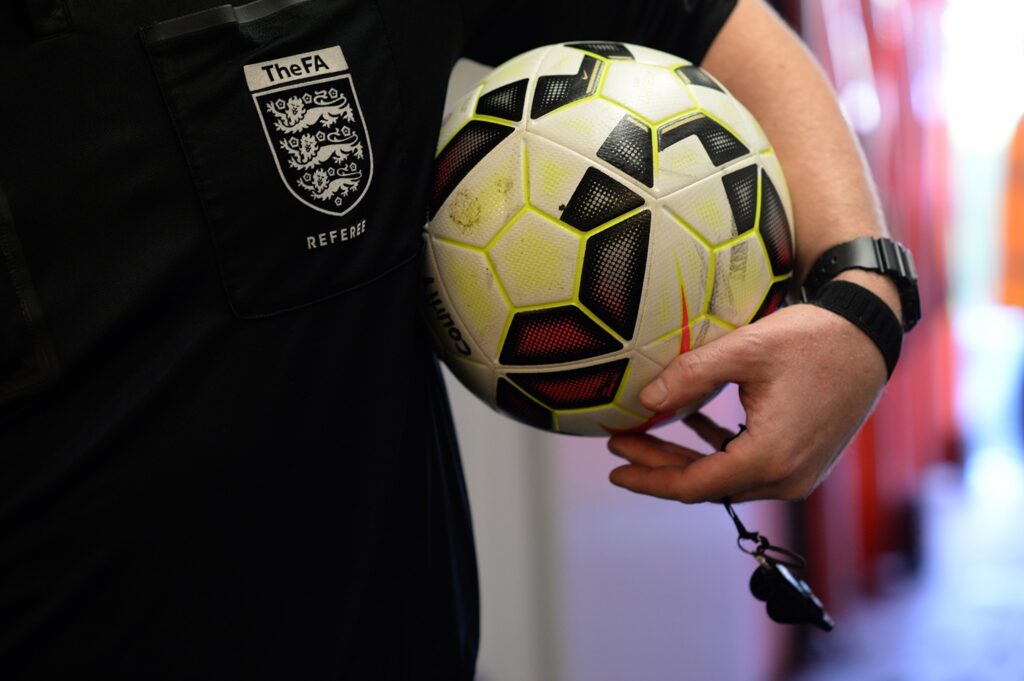Have you ever been at a football game and said to yourself, I should have made a better call than that ref! Okay, so you can shut up shouting at the television and begin the quest of becoming a real football referee in England. Be it a teenager who is mad about the game or an adult in search of a new interesting activity, officiating football may be a successful career or even an exciting side job.
So here is an actual guide on how one can become a qualified football referee in England in 2025. Spoiler warning: No, seriously, it is not that difficult; nevertheless, it requires determination, energy, and a strong pair of lungs.
It is a common question: why become a football referee?
Why is it more important to discuss before we get in the way? It is not all about whistle-blowing and issuing yellow cards. It is a position that instills discipline, leadership, communication, and the ability to make critical decisions. And it is an excellent opportunity to keep fit, make a few supplementary bucks, and get things in the beautiful game at a new angle.
Are you still not convinced? These are some of the additional advantages:
You are paid – referees are paid at each game, even at grassroots levels.
It is a flexible job – Refer to your heart’s content or as much as you like.
It’s career-building. – Ambitious? You might see it in the Premier League.
It makes you active – Skip the gym-play on a pitch.
Okay, now that we are all excited, it is time to get down to the nitty-gritty with regards to how one can end up becoming a referee in England.

Step 1: Be Conversant in the Various Referees in England
Referees in England are graded by levels and the start level is Level 9 (trainee) to Level 1 (top-tier, elite officials). In short:
-
Level 9 – Trainee Referee
-
Level 8 – Youth Referee (under 16 years old)
-
Level 7 – Referee (adult entry level)
-
Level 6–1 – Progressively higher levels for more experienced referees
-
Select Group – Professional referees officiating in leagues like the Premier League
Most of the new referees start from Level 7 (or Level 8 if under 16) and work their way up. Climbing the ladder depends on your performance, experience, fitness, and commitment.
Step 2: Do the FA Referee Course
Here everything starts. The FA Referees Course presents you with your official ticket to the world of refereeing. It is arranged through County Football Associations (County FAs) throughout England and gives you everything you need to know to walk onto a football field with full knowledge and training.
This is usually what the course entails:
Online courses (the introductory rules, playing situations, and FA instructions)
Practical training: face-to-face (on-pitch simulations and role-play)
A final evaluation game (in which they test you in an actual game)
The course tends to take approximately 20-30 hours, typically costing between 100 and 150, in accordance with the local County FA. This fee normally covers your official kit, including the whistle, referee cards, and course contents.
Hint: It is recommended that you book in advance, as these courses can get full, particularly in the football season.
STEP 3: JOIN Your local County FA
After you have completed your FA Referee Course, the next step is to enrol as a registered referee with your local County FA. This gives you the chance of being deployed to games and beginning to accumulate match-day experience.
You will get your individual FA Number (FAN) and name on the central referee database. Based on this, the County FA will then assist in matching you up with matches appropriate to your level, availability, and locality.
The majority of referees begin at grassroots-level football, that is, U12s, local leagues, and Sunday games, and then move on to more competitive levels.
Step 4: Match Practice (and Become Better)
The interesting part commences now. Just like everything in life, the more that you practise it, the better you become. The experience of refereeing in your first few matches may be filled with stress, but believe us, it becomes easier to deal with over time.
This is what you need to be concentrating on as a beginner ref:
Learn how to deal with players and coaches. The trick is self-assurance.
Make uniform decisions. Fairness is to be respected by the players more than perfection.
Communicate clearly. There is a loud, insistent whistle and signals of the hand that go a long way.
Stay fit. You will be running around a lot, in fact, more running than the players at times.
Keep learning. View games, talk to coaches, and receive a verdict.
Once you have fulfilled a total number of games officiated and your final assessment game, you will be allowed to advance upwards, as a Level 9 trainee, to a Level 7 official referee.
Step 5: Progress Through the Refereeing Ranks
Should you intend to take refereeing beyond a pastime activity on the weekends, the avenue to doing so is quite easily followed. The FA also conducts yearly promotion tests for those referees who want a promotion through the divisions.
To be in the running to become promoted, you will have to:
Play at least a few games each season
Clear fitness tests and evaluation, passing tests and assessments
Go to frequent maturation exercises for referees
Obtain good match scores from club officials and advisors
Also, if you are committed and performing steadily, you may find yourself officiating semi-professional or even professional games in a few years.
And yes, there is a route out there up to being a Premier League referee or even an official in the FIFA international circuit!
Step 6: Take part in the Referee Society or Mentoring Programme.
Refereeing may at times turn into a one-person trip, but you are not alone. Throughout England, there exist tons of referee associations, societies, and mentoring schemes that offer support, help, and friendship.
Belonging to a community is not only beneficial to improve yourself but also remains inspirational and connected by being in one. And who does not enjoy a healthy post-match briefing with other refs?
The following are some of the popular networks:
RA-FA Youth Council
Ref Support UK
Your County FA Local Referee Associations
Do not be afraid, just go and do and get active.
Step 7: Make Sure to Be Updated and Continue Developing
Football is a game that is continually changing, and so are the rules. This is the work of a referee to keep up to date. The FA amends the laws, interpretations, and standards of referees on a regular basis.
Here is how to be on top of your game:
The current IFAB Laws of the Game can be read
Observe and study the decisions of the elite referees
Become a member of online and referee discussion groups
Refereeing is not just a skill; it is a craft. And as in any craft, it becomes more honed with age, practice, and review.
FAQs
1. How many years does it take to become the highest rank of a football referee?
How long it takes to climb the ladder to the highest level of the football referee is dependent on your country, among other factors. Those interested in becoming a leading football referee in England would have to rise thumb by thumb ranks in the hierarchy of English football refereeing.
Every one of these grades is a phase that takes at least a year in the career of an average English football referee. And, usually, becoming one of the best referees in top football in England requires going through nine steps (officially called levels).
2. Is it mandatory that I am educated to become a football referee?
Conditions for becoming a football referee differ in countries and football leagues. Formal education may not be a must in some countries, but it is usually better that you be formally educated in case you want to become a professional football referee.
Take the US as an example; every state has its sports association that prescribes the minimum academic qualifications that football referees ought to have. Some states may require you to at least have a high school diploma (or equivalent degree) so that you can be qualified as a football referee.
You will have to attend courses in professional refereeing in England. Such courses are meant to provide you with practical (refereeing) skills. Although you will most certainly have to undertake several courses, they will not only make your general knowledge about being a referee better but also provide you with the necessary skills to handle various situations on the pitch properly.
3. Is the work of a football referee challenging?
Football is also a very quick game in which a referee should be able to improvise swift decisions even when faced with overwhelming pressure. Certainly, being a football referee is a challenging task, and it is because of this that a weak-minded referee may even prove to make the wrong rules on several occasions.
And also, a person who cannot withstand a period of active work, which is quite a lot of short runs and fast walks on a football field, may fail at football refereeing. This implies that football referees should possess great physical fitness with the capability of working for long durations. It is not only the footballers who run around the ground, but the referees as well, who run around during the football games.
Final Thoughts
Being a football referee in England is not only about blowing a whistle but also about becoming a key player in the most loved sport on earth. Be that as it may, whether you want to referee on the weekends junior games or ultimately spotlight the way of the Premier League, this course is stuffed with chances, development, and a VIP pass to a game you adore.
Now put on your boots, get out that whistle, and go to the centre of the pitch. This is where your career as a referee begins.
Don’t forget to leave the review, please.


